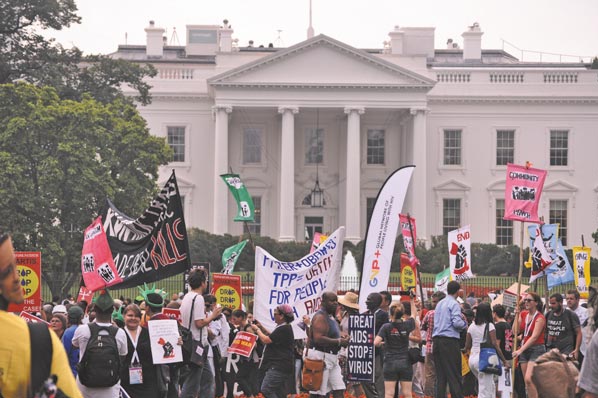The global fight against HIV/AIDS took root in Washington, D. C., this week.
Tens of thousands of people impacted by the disease, including scores of activists from Philadelphia, researchers, staff from AIDS organizations and policymakers, have spent the last few days learning, strategizing and raising their voices for a united front against the epidemic at the International AIDS Conference.
“It is so enormous that I can’t even begin to describe it in words,” said Elicia Gonzales, executive director of Gay and Lesbian Latino AIDS Education Initiative, who arrived in D.C. last Friday.
“It is the most profound and transformative experience I’ve ever been involved with,” she said. “The most amazing, beautiful and empowering thing is just the collective energy that’s here. It’s infectious, overwhelming and inspiring.”
That energy was most evident in Tuesday’s “We Can End AIDS” march.
The five branches of the mobilization — each spearheading a different human-rights cause — organized in Lafayette Park and then headed toward the White House.
More than 500 Philadelphia activists, organized by ACT UP and other local groups, joined in on the event.
ACT UP member Jose DeMarco said the size and makeup of the crowd in D.C. was helpful in communicating their demands.
“This is one of the largest mobilizations ACT UP Philly did locally in probably 15 years. And when we got to D.C., I was overwhelmed by the masses of people,” he said. “For whoever was watching — Congress people, their staffers — the diversity of the crowd sent a clear message. I saw African-Americans, white people, Asian folks, Native-Americans, everyone was represented and that said these issues are affecting everyone. It was incredible to see global, national and local communities all come together for this one day.”
After the march, 13 activists were arrested for tying red ribbons and empty pill bottles to the gates of the White House, including ACT UP Philadelphia member Roy Hayes and former Philadelphia activist Julie Davids.
DeMarco said he was unsure how long the activists were detained.
Robert Breining, founder of social-network site POZIAM, has been broadcasting live for his Internet radio show from the conference.
A Philadelphian diagnosed over 10 years ago, Breining said the personal representations of the disease’s impact, such as the AIDS Memorial Quilt, resonated most with him.
“It’s eye-opening,” Breining said. “It’s very emotional to read the stories and the letters, [to] see the photos of family members.”
All 54 tons of the quilt — comprised of personally crafted tributes to victims of the disease — have been on display in D.C. this month. Due to the size of the 1.3-million square-foot quilt, many of the panels have been rotating daily at locations throughout the city.
Breining said it’s particularly important for younger people to appreciate the quilt’s scale.
“It’s a history lesson, especially for those who are newly diagnosed,” he said. “The younger generations often think that if you’re diagnosed with HIV, you can just take a pill and you’re fine. Now it’s a manageable disease, but it’s important for people to see this quilt because our history cannot be forgotten.”
Breining said the Global Village, an expansive free forum for visitors to explore a range of issues, has also been effective in bringing the personal side of the disease to life.
Gonzales said she has gotten the chance to take part in a number of events promoting sex-positive messaging in HIV prevention, of which she is a proponent, and also intends to take in some numbers-based sessions.
“I need to figure out how to blend the more touchy-feely side of prevention — collaboration, leadership development, mentorship — with the biomedical side, the integration of evidence-based practice and science,” she said.
Both Breining and Gonzales agreed the connections they’ve made have been invaluable.
“It makes you see that we’re just one piece in part of this bigger puzzle,” Gonzales said. “So many people are doing amazing, brilliant work out there, and it’s really inspiring.”
Gonzales, who has been covering the event through social media as one of 20 people selected as ambassadors for the National Latino AIDS Action Network, encouraged those who can’t be there in person before the conference wraps July 27 to stay abreast of the goings-on in the capital.
“Philadelphia is just a blip away from D.C.,” she said. “This is a once-in-a-lifetime opportunity. Even if people can only make it down for a few hours, they need to be here. And if not, they’ve got to pay attention to what’s been going on.”

